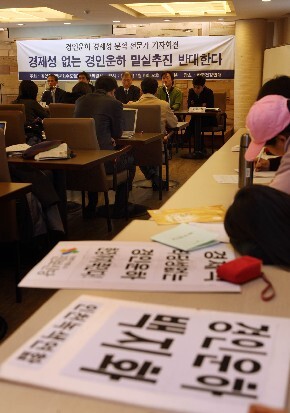hankyoreh
Links to other country sites 다른 나라 사이트 링크
More faults found with canal study

It is gradually becoming apparent that in its study of the economics of its proposed Seoul-Incheon canal, the Lee Myung-bak administration has sexed up the study’s findings, playing down the expected cost of construction and exaggerating the demand for the canal.
In particular, the speed of the river-sea ships (RSS, RS ships) the study talks about for shipping along the canal are slow, making them weak competitors in the shipping industry.
“It takes four hours to ship something by truck between Seoul and Busan,” says one shipping consigner. “Who would go by way of the Seoul-Incheon canal when it would take between thirty and forty hours to get to the Port of Busan?”
On Friday, the Ministry of Land, Transport, and Maritime Affairs claimed the normal speed of river-sea ships is 35 kilometers per hour and is therefore not much different from regular shipping vessels. According to the ministry, the time it would take to go from Suwon to the Busan East Container Terminal would take 23 hours for a total of 35 hours in shipping time, adding 30 minutes to load 250 containers, and four hours for holding and transfer.
European river-sea ships, however, are said to range between 10 to 25 kilometers per hour in speed, and their undersides are wide so as to be able to contain large loads.
One shipping company official noted that Hanjin Shipping tried operating container ships between Incheon and Busan “but stopped several years ago” and said that it “took 31 hours traveling at 27 kilometers per hour.”
Considering that Hanjin Shipping’s sea-going container ships moved at 27kph, the Ministry of Land, Transport, and Maritime Affairs is essentially saying that the river-sea ships that would travel along the Seoul-Incheon canal would be faster than container ships.
“The bottoms of regular container ships are streamlined, but river-sea ships aren’t, which means that river-sea ships are inevitably slower if they run on the same fuel,” said Hanshin University Professor Lim Suk-min. “You could make them faster with bigger engines but that would cost more fuel and be wholly uneconomical.”
In other words, if the Korea Development Institute had based its predictions of shipping demand on river-sea ships, then the canal would make far less economic sense than initially claimed.
Please direct questions or comments to [englishhani@hani.co.kr]
Editorial・opinion
![[Column] Park Geun-hye déjà vu in Yoon Suk-yeol [Column] Park Geun-hye déjà vu in Yoon Suk-yeol](https://flexible.img.hani.co.kr/flexible/normal/500/300/imgdb/original/2024/0424/651713945113788.jpg) [Column] Park Geun-hye déjà vu in Yoon Suk-yeol
[Column] Park Geun-hye déjà vu in Yoon Suk-yeol![[Editorial] New weight of N. Korea’s nuclear threats makes dialogue all the more urgent [Editorial] New weight of N. Korea’s nuclear threats makes dialogue all the more urgent](https://flexible.img.hani.co.kr/flexible/normal/500/300/imgdb/original/2024/0424/7317139454662664.jpg) [Editorial] New weight of N. Korea’s nuclear threats makes dialogue all the more urgent
[Editorial] New weight of N. Korea’s nuclear threats makes dialogue all the more urgent- [Guest essay] The real reason Korea’s new right wants to dub Rhee a founding father
- [Column] ‘Choson’: Is it time we start referring to N. Korea in its own terms?
- [Editorial] Japan’s rewriting of history with Korea has gone too far
- [Column] The president’s questionable capacity for dialogue
- [Column] Are chaebol firms just pizza pies for families to divvy up as they please?
- [Column] Has Korea, too, crossed the Rubicon on China?
- [Correspondent’s column] In Japan’s alliance with US, echoes of its past alliances with UK
- [Editorial] Does Yoon think the Korean public is wrong?
Most viewed articles
- 1‘We must say no’: Seoul defense chief on Korean, USFK involvement in hypothetical Taiwan crisis
- 2N. Korean delegation’s trip to Iran shows how Pyongyang is leveraging ties with Moscow
- 3Amnesty notes ‘erosion’ of freedom of expression in Korea in annual human rights report
- 4[Column] Park Geun-hye déjà vu in Yoon Suk-yeol
- 5‘Weddingflation’ breaks the bank for Korean couples-to-be
- 6[Reportage] On US campuses, student risk arrest as they call for divestment from Israel
- 7[Guest essay] The real reason Korea’s new right wants to dub Rhee a founding father
- 8[Editorial] New weight of N. Korea’s nuclear threats makes dialogue all the more urgent
- 9Will NewJeans end up collateral damage in internal feud at K-pop juggernaut Hybe?
- 10Why Korea shouldn’t welcome Japan’s newly beefed up defense cooperation with US